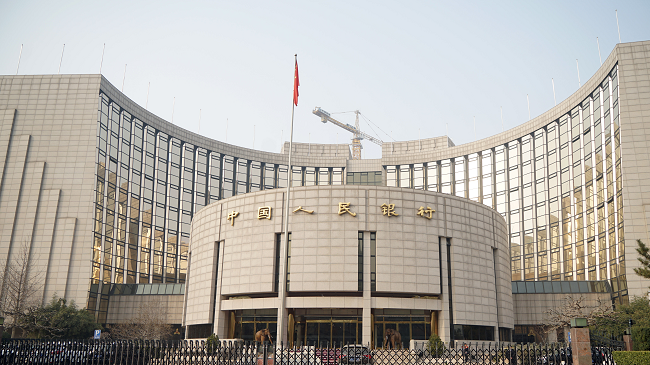Bank card clearing license a step forward in China's financial market opening-up
Editor's note: Matteo Giovannini is a finance professional at ICBC in Beijing and a member of the China Task Force at the Italian Ministry of Economic Development.

The headquarters of the People's Bank of China in Beijing, March 13, 2018. /Xinhua
The rising political tensions with the United States seem not to affect China that is continuing to strictly adhere to the roadmap for the development of its domestic financial market by involving more and more foreign companies able to provide those best practices that are a necessary component for turning China into a future financial powerhouse.
Recently the news that the People's Bank of China (PBOC) has given the green light to the issuance of a license to Express (Hangzhou) Technology Services Co., a joint venture between American Express and LianLian DigiTech Co. Ltd, to start bank card clearing services on the Chinese mainland has become the headline of major financial media outlets.
According to the statement from the central bank, the joint venture will be able to process online, and offline payment transactions and this decision is going to make American Express the first foreign payments network to be allowed to process local currency transactions in one of the world's largest markets where mobile transactions are valued at 27 trillion U.S. dollars.
This move represents a breakthrough moment in China's credit card market that has long been dominated by the monopolistic position of China UnionPay after an opening-up process started in 2015. It also represents China's commitment to delivering what was agreed and promised when signing a phase-one trade deal with the United States on January 15.
In addition, the approval marks China's clear intent to open its huge financial market valued at around 45 trillion U.S. dollars in the attempt to attract more foreign capital and investments that are even more necessary now to support the domestic growth under the influence of the COVID-19 pandemic.
The green light to credit card companies is part of a broader plan that includes previous similar decisions made by the Chinese regulator in insurance and banking by lifting restrictions on company establishment and shareholder status, in asset management by allowing foreign investors to gain full control of mutual funds, and in securities by removing any cap on foreign ownership. U.S. financial firms such as Blackrock, Vanguard, Goldman Sachs, JP Morgan, and Morgan Stanley have all recently taken important initiatives to increase their role in China's development by capturing higher margins.
From American Express's perspective, the license represents an award to its patience and commitment to China, considering that the company had its first card issued in China with ICBC under UnionPay local network back in 2004.
The company's mission to gain market share in the highly competitive Chinese market is certainly not going to be easy considering the presence of local competition that includes tech titans such as Alipay and WeChat Pay but strategic cooperation instead of confrontation with leading Chinese mobile wallet providers could be the key for American Express to reach a good part of the clientele and play its part in the credit card market.
The decision could also provide some degree of confidence to other foreign credit card companies such as Mastercard and Visa that have for a long time applied in the hope of receiving approval to get into the Chinese market and could now see the PBOC's approval to American Express as an encouraging precedent for their future chances of winning a license.
Probably one of the most significant takeaways from this decision is that foreign companies' patience and full commitment to China will sooner or later pay off. This is not only the case of financial firms but also of high tech, food and retail companies such as Apple, Starbucks, KFC and Nike that have invested enormous resources from a human, financial and time perspective and have eventually been handsomely rewarded by the Chinese market and by the government appreciation.
A clear and unquestionable message that comes out from China's decision to assign a license to American Express is that on the one hand, China is open to a free, global and transparent relationship with other countries by offering more opportunities to access its domestic market; on the other hand, no matter what the current U.S. administration plans in terms of decoupling, American companies want to be in China and want to do business with China. This is the most comforting demonstration of a general and borderless commitment to global trade and common prosperity.

